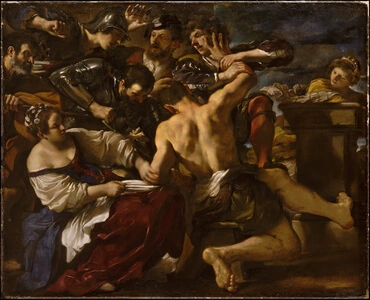1
Au septième mois, Ismaël, fils de Nethania, fils d'Elischama, de la race royale, vint avec des grands du roi et dix hommes auprès de Guedalia, fils d'Achikam, à Mitspa. Là, ils mangèrent ensemble à Mitspa.
2
Alors Ismaël, fils de Nethania, se leva avec les dix hommes dont il était accompagné, et ils frappèrent avec l'épée Guedalia, fils d'Achikam, fils de Schaphan; il fit ainsi mourir celui que le roi de Babylone avait établi gouverneur du pays.
3
Ismaël tua encore tous les juifs qui étaient auprès de Guedalia à Mitspa, et les Chaldéens qui se trouvaient là, les gens de guerre.
4
Le second jour après l'assassinat de Guedalia, tandis que personne n'en savait rien,
5
il arriva de Sichem, de Silo et de Samarie, quatre-vingts hommes, qui avaient la barbe rasée et les vêtements déchirés, et qui s'étaient fait des incisions; ils portaient des offrandes et de l'encens, pour les présenter à la maison de l'Eternel.
6
Ismaël, fils de Nethania, sortit de Mitspa au-devant d'eux; il marchait en pleurant. Lorsqu'il les rencontra, il leur dit: Venez vers Guedalia, fils d'Achikam.
7
Et quand ils furent au milieu de la ville, Ismaël, fils de Nethania, les égorgea et les jeta dans la citerne, avec l'aide des gens qui l'accompagnaient.
8
Mais il se trouva parmi eux dix hommes, qui dirent à Ismaël: Ne nous fais pas mourir, car nous avons des provisions cachées dans les champs, du froment, de l'orge, de l'huile et du miel. Alors il les épargna, et ne les fit pas mourir avec leurs frères.
9
La citerne dans laquelle Ismaël jeta tous les cadavres des hommes qu'il tua près de Guedalia est celle qu'avait construite le roi Asa, lorsqu'il craignait Baescha, roi d'Israël; c'est cette citerne qu'Ismaël, fils de Nethania, remplit de cadavres.
10
Ismaël fit prisonniers tous ceux qui restaient à Mitspa, les filles du roi et tous ceux du peuple qui y demeuraient, et que Nebuzaradan, chef des gardes, avait confiés à Guedalia, fils d'Achikam; Ismaël, fils de Nethania, les emmena captifs, et partit pour passer chez les Ammonites.
11
Jochanan, fils de Karéach, et tous les chefs des troupes qui étaient avec lui, furent informés de tout le mal qu'avait fait Ismaël, fils de Nethania.
12
Ils prirent tous les hommes, et se mirent en marche pour attaquer Ismaël, fils de Nethania. Ils le trouvèrent près des grandes eaux de Gabaon.
13
Quand tout le peuple qui était avec Ismaël vit Jochanan, fils de Karéach, et tous les chefs des troupes avec lui, il en eut de la joie;
14
et tout le peuple qu'Ismaël avait emmené de Mitspa se retourna, et vint se joindre à Jochanan, fils de Karéach.
15
Mais Ismaël, fils de Nethania, se sauva avec huit hommes devant Jochanan, et alla chez les Ammonites.
16
Jochanan, fils de Karéach, et tous les chefs des troupes qui étaient avec lui, prirent tout le reste du peuple, et le délivrèrent des mains d'Ismaël, fils de Nethania, lorsqu'il l'emmenait de Mitspa, après avoir tué Guedalia, fils d'Achikam. Hommes de guerre, femmes, enfants, eunuques, Jochanan les ramena depuis Gabaon.
17
Ils se mirent en marche, et s'arrêtèrent à l'hôtellerie de Kimham près de Bethléhem, pour se retirer ensuite en Egypte,
18
loin des Chaldéens dont ils avaient peur, parce qu'Ismaël, fils de Nethania, avait tué Guedalia, fils d'Achikam, que le roi de Babylone avait établi gouverneur du pays.







